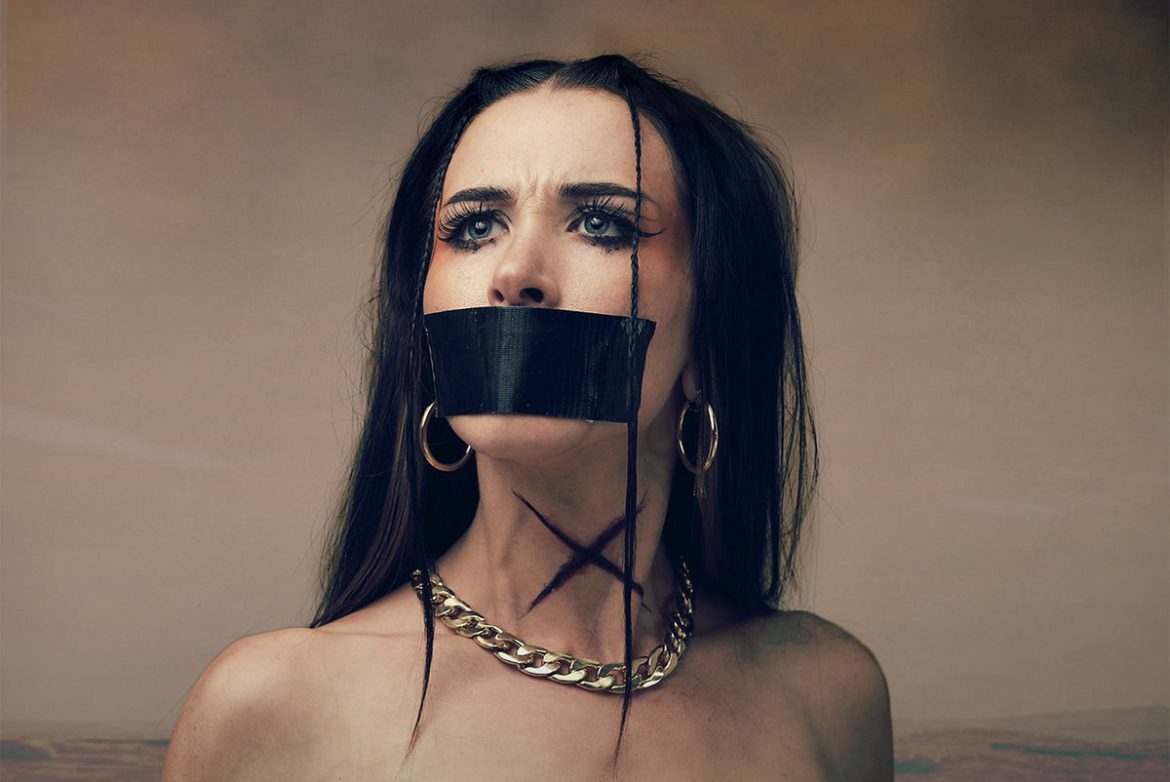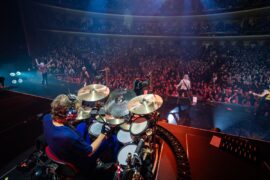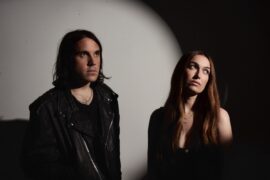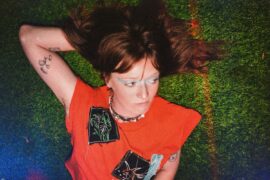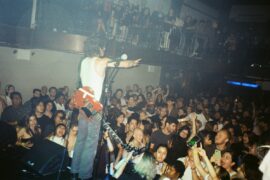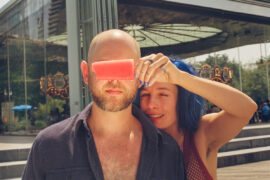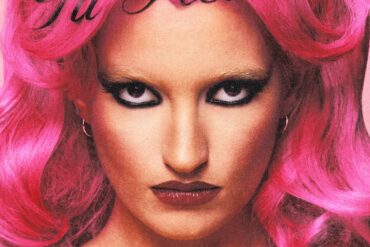With ‘Shame,’ Brighton-based Fable has successfully crafted a multi-genre debut album where each track lands as bold, provocative, and authentically hers.
Stream: ‘Shame’ – Fable
‘Shame’ is about questions and disequilibrium, almost like the atmosphere of the last days of an empire, before it falls.
Fable has successfully crafted a multi-genre debut album where each track lands as bold, provocative, and authentically hers.
The Devon-born artist already gained a reputation as one of the UK’s most intriguing rising artists with comparisons to the likes of David Bowie, Björk, and Nine Inch Nails in The Rolling Stone, The Guardian, and more. Following a brief hiatus, Fable has returned to music with her debut album Shame, including singles like “Orbiting” and “Thirsty,” both of which were already well received upon their initial release.
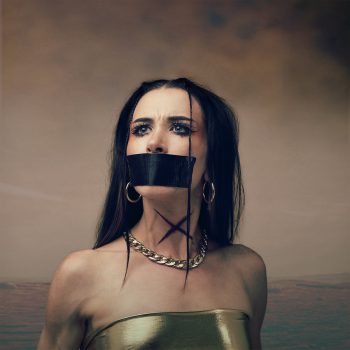
I just wanna be in 1993 before I was a baby
‘Cause everybody seemed blissfully unaware
Of the comet and the sunbeam
Fate revolution live mainstream
I′m not playing that game,
the future of the earth′s insane
My generation lost to the
Isn’t it a shame
That′s all anybody seems to say
– “Shame,” Fable
Born Holly Cosgrove, Fable initially relocated to Brighton in her late teens to pursue a musical career. After a successful collaboration with Archive, she released the EP Parasite featuring lead single “Stranger in my Head,” which has since amassed over 100,000 streams and cemented her position as an artist on the rise.
Her career only grew exponentially from here, with opportunities to perform at Glastonbury Festival in 2016 and tour with British rock band The Cult. Following personal tragedy, however, the artist decided to take a step away from the spotlight to focus on her mental health. Shame, released in May 2022 via Naim Records, marks Fable’s full return to music, and with this she has emerged triumphantly with an atmospheric collage of neo-soul, funk, and EDM influences enveloping a larger commentary on mental health and the looming trajectory of our generation.
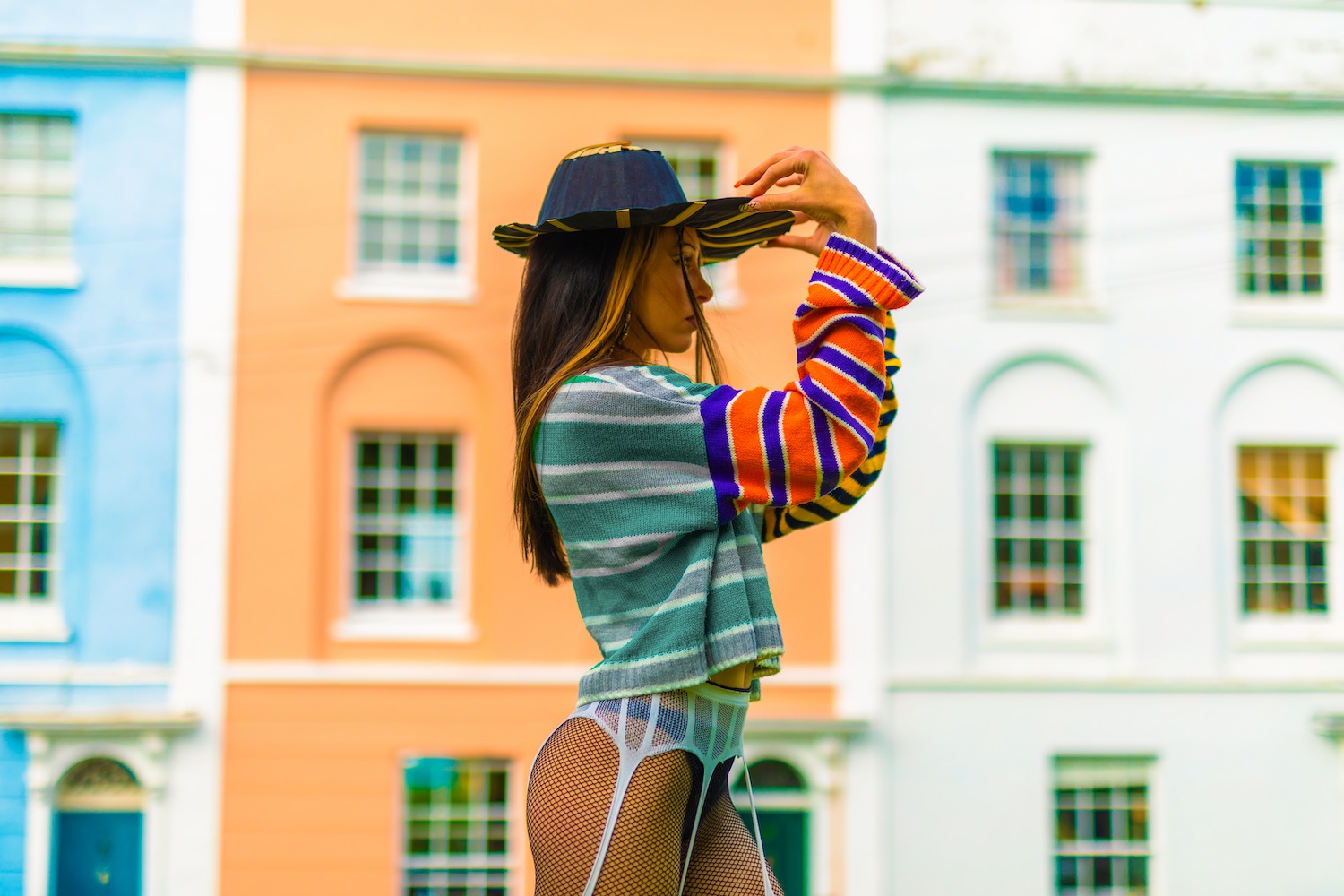
“Shame is about questions and disequilibrium,” Fable shares. “Almost like the atmosphere of the last days of an empire, before it falls. It’s not an attempt to use art as a political expression. It’s more like a collection of observations about our culture, and how alienating it can feel to live inside.”
Fable sat with Atwood Magazine to discuss her debut album, from lyrical influences to melody constructions to the moments that make the music her own.
We’ve created this epidemic of depression, the poverty crisis, the huge levels of systemic corruption, the collapsing ecosystem… I couldn’t really write an album without mentioning the stuff that was on my mind every day!
— —
:: stream/purchase Shame here ::
A CONVERSATION WITH FABLE

Atwood Magazine: I wanted to start by saying congratulations on the album release! How does it feel to have this released after such a long hiatus? And what was it like getting back into the rhythm of creating music?
Fable: I think it’s one of those things where, before I even write something, I’m writing about stuff that I’ve kind of already dealt with. So it’s quite nice to have it out. And then over time, you sort of get this kind of feeling like you understand the songs a lot more than you did when he first kind of wrote them. And just having that sort of latency in understanding the meanings is really lovely. And also quite stressful, because people are hearing it and you kind of just realized what you’ve put out almost emotionally. It’s definitely like baring your unconscious souls that you’re unconscious of before but I’m really getting some nice vibes from people on it and people saying that it’s kind of hit an emotional streak of them, and especially tracks like “Orbiting” have been successful on the record.
It’s just really lovely to hear people appreciating something that you’ve made. It’s like a really simple statement. But yeah, like, it gets you there. So really, really kind of really happy that I released it. But also, I’m kind of now going, ‘What could I have done better?’ Obviously, as an artist, you’re always kind of criticizing yourself, like self doubt. How can you push it a little bit further, because you know that there’s always a bit more in you that you can give. So like, I think, well, that’s what keeps you going into the next project?
I was going to say, because I know, your hiatus was so long. Did this break have any change or effect on your sound? I was listening to your earlier singles like ‘Human Pretending’ which has more of a Bowie vibe, but then listening now to Shame there’s neo soul, jazz, a whole wide variety.
Fable: Yeah, I think there’s a lot of things that kind of swayed my musical tendencies with this record. One, I think, was my partner at the time and his influence. A lot of the music we were listening to, I’ve always been a massive fan of Portishead, and Trip Hop and that sort of thing. And I really wanted to bring that forward. I think a lot of the last EP was written when I was like an adolescent. And I was really into my metal and Tool and, and kind of like wanting to have this violence on stage with it. I wanted the music to be as powerful so I could kind of communicate that more. But I think with the writing during a pandemic, as well, life was a lot slower. So the music that I was listening to was more for soothing qualities.
And that kind of came out a lot more when I was in the studio. I was working with a producer called Jonas Persson, and he’s very classically oriented. So there were a lot of almost string arrangements, and organic sounds, but then I kind of brought this element of chaos to the table in the writing, and he kind of had the order. So we created something that was like something in between those two things, which I think worked really well.
Yeah, while listening to the album, I noticed the strings and the classical influence, but there's also like, very noticeable shifts in the sound through each song. So how did you and this producer decide, in a way, the genre of each piece, or what every track would sound like?
I think there’s, there’s a difference in there’s a lot of slow down break beats on the record and the stuff that I want to communicate lyrically, that’s very internal, takes on those kind of sonic realms a bit more, and then the movies and then the kind of the stuff that’s more talking about interacting with the world and what I want to say is definitely more electronic and jarring, like tracks like “Unequal” and “Thirsty.” I think it’s kind of that contradiction between the two elements of my personality and my kind of extroverted side and my introverted side, have like these two different qualities, sonically. So I think that’s part of it.
That’s part of the decision making, and in a very organic way it kind of came together. Or I would write the slightly more introspective tracks and Jonas would take from that feeling and marry it into his kind of idea of sonics. But yeah, it’s a real, it’s a real kind of schizophrenic genre fluid album in general, like, I think that kind of says quite a lot about where my musical inspirations come from. I’m a huge fan of, obviously, people like Kate Bush, and artists that create emotional universes and live within those. But then also, I kind of got quite a lot to say, maybe politically, just about the state of society and the world, and where my kind of generation finds itself and all that.
That’s actually a perfect segue into my next question, because I noticed a lot of themes of this overarching generational message, and wanted to get a more in depth explanation. What is the message of the album, would you say?
Fable: Shame is about questions and disequilibrium, almost like the atmosphere of the last days of an empire, before it falls. It’s not an attempt to use art as a political expression. It’s more like a collection of observations about our culture, and how alienating it can feel to live inside. I think the album is about the regrettable and unfortunate situation of modern society. We’ve created this epidemic of depression, the poverty crisis, the huge levels of systemic corruption, the collapsing ecosystem… I couldn’t really write an album without mentioning the stuff that was like, on my mind every day, right?! I think it was what inspired the entire thing.
Why I decided to call it Shame was this kind of phrase that you tend to hear like the people over 40s, using quite a lot. Like “Oh, that’s a shame.” And then it’s like in response to something terrible, that is desperately in need of immediate action. But this phrase seems to bring on this woozy apathy, followed by an amnesia, or swift change of topic. It was that particular phrase that sparked my writing.
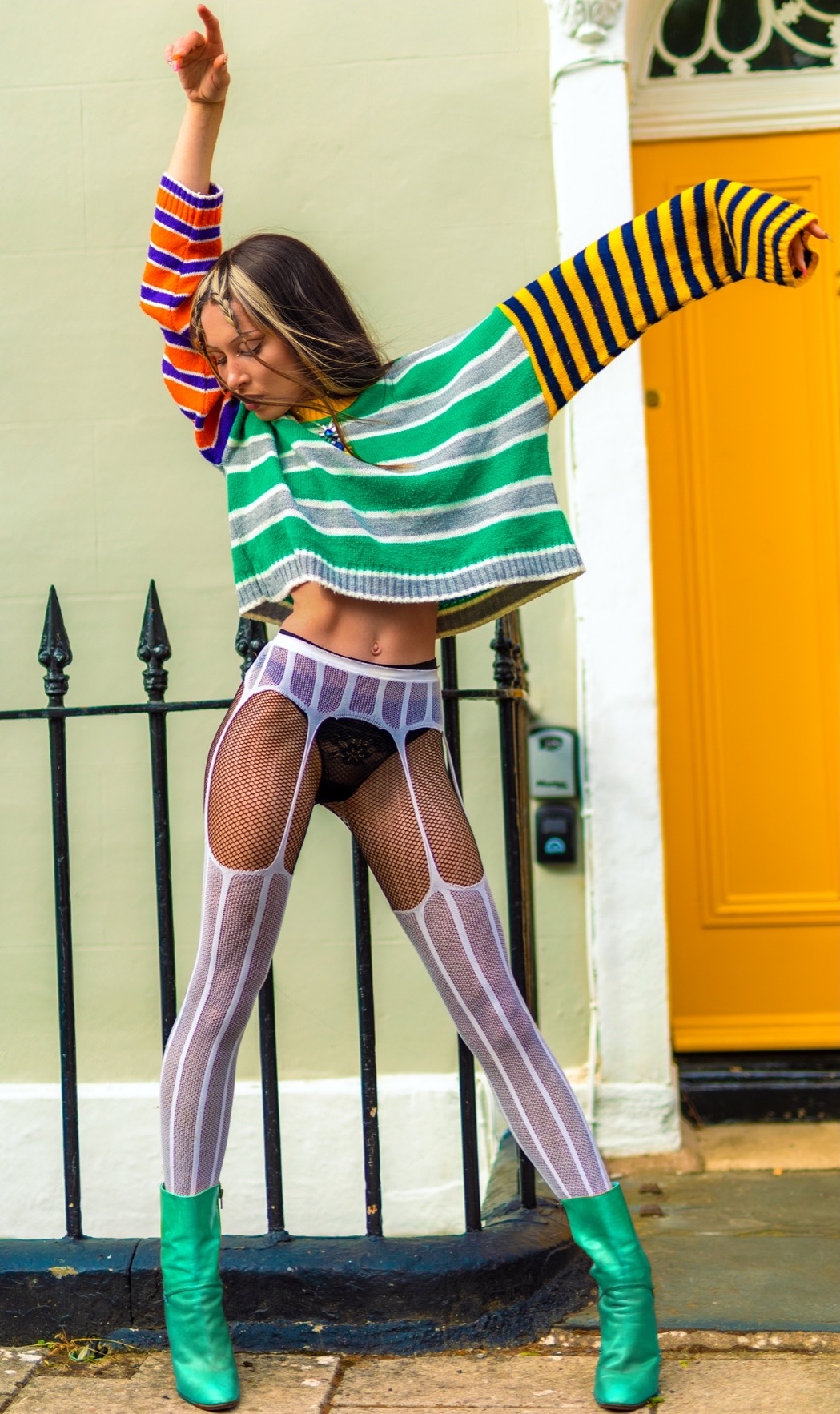
It’s more like a collection of observations about our culture, and how alienating it can feel to live inside. I think the album is about the regrettable and unfortunate situation of modern society.
Your writing especially uses a lot of metaphors. And one that I wanted to bring up was the opening to 'Unequal': “A ripple, a shockwave emanating from a plastic sea. I tried to preserve you but I had to tape over me,” this reminded me of the Shame cover art. So, this might be an odd question, but could you just describe the image outside of the margins with that cover? Like, what was the feeling of that image you wanted to convey?
Fable: So ‘a ripple a shockwave emanating from a plastic sea’ is like, it’s almost this feeling of this our emotions is the ocean and this plastic is kind of like, the culture that sits on top of it that stops us from being able to, like access that in a sense. It’s kind of like buzzwords, you know. And I mean, with that song, it’s so so quick. And the lyrics are coming at you and I kind of wanted to just fire out these images, and for those images to then create in the listeners mind, a mood board of like, the reality that I’m talking about. And yeah, I mean, “Unequal” is a protest song, in a sense. And it’s trying to create an internal fire in people that is kind of moving. I hope it is, anyway.
So you're also touring this album right now. What's been the process of bringing this project to life for an audience?
Fable: It’s been really interesting trying to take that music and, and create an experience that is different from the album. I’ve got a band that I work with, there’s four musicians, and live we kind of go back to the roots of the EP, which is a lot more rocky. But then it has these like, like soulful moments in it. That’s really really enjoyable because it’s those moments where I actually feel like I connect the most with the audience, like with songs like “Orbiting” and “Onion Brain.” But it’s really nice to be able to take songs like “Thirsty” and the ones that really are meant to hit in a rocky sense.
Live, there’ve been a few hurdles that we’ve had to overcome where the band hasn’t been available for a few gigs. So I’ve had to go and do it just purely with backing tracks and dancers. So that’s given it a slightly more pop vibe, I think like live, which depending on where I’m doing, it works so well in some settings. And if you’ve got the right PA and you’ve got the right, bass and that like kick from the, from the backing tracks. So there’s been a few like little creative hurdles to get over with it. But generally, I’m really enjoying playing it all live with a band because it just gives it something else. And you can’t beat that atmosphere of playing with live musicians. It’s just like, that’s where it’s at. And that’s why I make music just for that energy.
Do you have a favorite song to perform? I know, you said songs like ‘Onion Brain’ help you connect with the audience more, is that where you find yourself in your element the most?
Fable: Yeah, I think, with “Onion Brain,” it’s one of those live where you can tell if people are enjoying the gig because it’s quiet. And people are like listening, like, intently to the song. And that’s when I know that I’ve kind of, like worked it right and captured them. But yeah, I think I personally enjoy songs where I can get really sweaty and, and kind of throw my limbs around and, and be the person I am in my soul essentially man. I feel like that’s what I look for, getting on stage and, and kind of trying to channel what I was feeling emotionally when I was writing the songs.
I was looking on your Instagram earlier again today and saw you'd release this like behind the scenes of the ‘Shame’ music video, which is incredible but also makes so much sense when put together. So could you describe like working with that director to create that visual kind of hodgepodge, because I think that pretty clearly, like you said, describes the entire album's message.
Fable: Completely. So there’s three main characters in this music video. So you kind of got the toxic and angry media presenter who represents the thing that’s being fed, right, and then you got like, the victim of that which is the bride that’s slightly addicted to social media. And she’s the victim of that culture. And then you also got these two spirits of gluttony and addiction, and they all kind of weave in to kind of tell this narrative of our culture and our inseparable relationship to the media. And how that has a massive effect on our psyches, essentially.
The whole song is about the overconsumption and addiction and feeling a separation between the real world and this reality that’s being presented to us on a screen. It’s kind of like all those things put together. What I’m trying to communicate is that it’s all a house of cards, because it all falls apart in the end. So it will crumble. And, you know, the illusions eventually will show themselves.

What I’m trying to communicate is that it’s all a house of cards, because it all falls apart in the end. So it will crumble. And, you know, the illusions eventually will show themselves.
So with this overconsumption, how do you separate yourself from the disconnectedness, or what do you say is like the solution to the problem?
Fable: I think it’s a bit of an open ended one, the only solution that we have is our relationship with each other. And I think that the most important thing is our communication. And there’s tracks on that album that try and try to talk about this a little bit more. “Swarm” is kind of like my own enlightenment and questioning of the nature of reality, and then there’s tracks like the opening track, “Fall Away,” which is about transcendental meditation and trying to be here and present, despite all of these massive distractions.
So yeah, the album’s got a lot of light and dark, and it’s got a lot of messages in it. But it’s all from my experience, as well: Living in this little tunnel vision of media that musicians are kind of forced into constantly, and having to keep that up. But it’s also trying to remind us, and remind myself actually, that there is connection in the world. Despite all of the media that’s trying to separate us, we are stronger together.
Despite all of the media that’s trying to separate us, we are stronger together
— —
:: stream/purchase Shame here ::
Stream: ‘Shame’ – Fable
— — — —

Connect to Fable on
Facebook, Twitter, Instagram
Discover new music on Atwood Magazine
? © Emily Parker
:: Stream Fable ::

